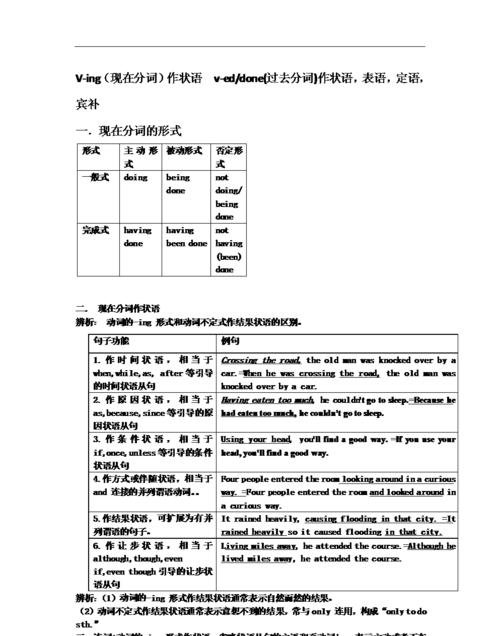本文目录
英语后置定语例句
现在分词作定语时,置于它所修饰的名词之后。这种现在分词往往相当于一个定语从句,表示正在进行的作用,如:
This is Mr. Smith speaking. 我是史密斯先生。(电话用语)
Oh, it’s the cake burning. 噢,糕点烧焦了。
有些现在分词作为定语则必须置于它所修饰的名词之后,它已与其前的名词构成一种固定的搭配。如:
This is nothing doing. 不行!(nothing doing是一固定词组,表示拒绝)
Let’s drop the subject for the time being. 让我们现在不再谈这个话题了吧。(for the time being是一固定词组)
They’ve had rich harvests for three years running. 他们已连续三年获得丰收。(running常置于表示时间的名词之后表示“连续的”)
现在分词短语一般皆须置于其所修饰的名词之后,相当于一个定语从句,但较从句简洁,故多用于笔语中。如:
A little child learning to walk often falls. 学走路的小孩常常跌跤。
Houseplants requiring constant attention are not suitable for working couples with little spare time. 业余时间不多的双职工不宜养育经常需要护理的家种植物。
以上所举的现在分词及其短语皆是限制性定语。现在分词及其短语亦可用作非限制性定语。如:
There I met a friend, fishing. 我在那里遇见一个朋友,他在钓鱼。
Leo Tolstoy was a great realist, writing about ordinary men and women in their misfortunes. 列夫·托尔斯泰是一个伟大写实主义者,写了许多平凡的不幸中的人。
现在分词短语用作定语时,其所表的时间一般应与句中的谓语动词所表的时间相同。以上诸例皆是如此。但有时二者所表的时间亦可不同,尤其当现在分词表示一般现在时的含义或将来的含义时。如:
A young man writing novels came to speak to us yesterday. 一位写小说的青年昨天来向我们作报告。(现在分词writing=who writes)
Do you know the number of people coming to the party? 你知道来参加晚会的人数吗?(现在分词coming=who will come)

英语后置定语例句
一、 形容词作复合不定代词的后置定语
当被修饰词为复合不定代词something, anything, nothing, everything; somebody, anybody, nobody, everybody; someone, anyone, everyone, no one时,修饰语常位于被修饰的不定代词之后。
(1) Do you have anything else to say about it?
关于这件事,你还有什么要说的吗?
(2) I have something important to tell you.
我有些重要的事情要告诉你。
(3) Someone important will give the students a lecture on how to learn English well.
今天下午,一位重要的人物将给学生们做一场有关如何学好英语的报告。
二、 形容词作疑问词的后置定语
修饰疑问词what, which, who, whose, whom, when, where, why, how时,修饰语要后置。
(1) What important would you like to talk about?
你想谈论什么重要的事情?
(2) What else would you like to eat?你还想吃什么?
(3) Where new have they decided to visit?
他们决定到哪些没有去过的地方参观?
三、 enough作后置定语
enough(a.)修饰名词时既可以在名词前,也可以在名词后。
(1) We have not enough time (time enough) to do the job.
我们没有足够的时间做该工作。
(2) They have enough people(people enough)to do the experiment.
他们有足够多的人手做这个实验。
但enough(adv.)修饰形容词或副词时,须位于被修饰的形容词或副词之后。例如:good enough (足够好的),big enough(够大的),fast enough(够快),carefully enough(足够仔细)。
四、 介词短语作后置定语
the map on the wall 墙上的地图
the bird in the tree 树上的那只小鸟
the development of China 中国的发展
the way to the school 去学校的路
the life in the future 未来的生活
五、 动词不定式作后置定语
1.在某些名词结构中可用动词不定式作后置定语。
(1) He has lots of things to do.他有很多事情要做。
(2) Jack needed someone to carry the box.
杰克需要人来搬这个箱子。
(3) She always the first one to arrive at the school.
她总是第一个到达学校。
(4) There are a lot of things to do. 有许多事情要做。
2. 在某些名词后可用动词不定式作定语。
例如:ability, decision, chance, courage, right,determination, promise, ambition, drive, effort, eagerness, failure, movement, need, opportunity, plan, reason, struggle, time, way, wish,等等。
(1) I don’t have the courage to tell you the truth.
我没有勇气告诉你事实。
(2) Does he have the ability to do the work?
他有能力干这项工作吗?
(3) You have no right to do such a thing!
你没有权利做这样的事!
(4) I’ll show you my determination to stop smoking.
我将向你们表明我戒烟的决心。
六、 分词短语作后置定语
1. 现在分词短语作后置定语。
(1) There is a dog lying on the ground.
有只小狗躺在地上。
(2) The girl sitting by my side is my sister.
坐在我旁边的是我妹妹。
(3) Here is a map showing you how to get to the railway station.
这儿有一张地图,告诉你怎样去火车站。
2. 过去分词短语作后置定语。
(1) This is a film directed by Feng Xiaogang.
这是一部由冯小刚导演的电影。
(2) She is a nurse trained by ourselves.
她是我们自己培养的护士。
(3) What is the language spoken in Spain?
西班牙使用的是什么语言?
3. 部分过去分词也可以作后置定语。
例如:left, gained, used, offered, discussed, ordered, wounded, injured, concerned, conducted, done, held, arranged, planned, suggested, finished, completed, arrested, given, fallen, constructed, missed,等等。
(1) Is there anybody injured?有人负伤吗?
(2) The money left is not enough for so many people to live through.
剩余的钱不够这么多人用的。
(3) She liked all the courses offered.
她对所开的课程都很喜欢。
(4) The experience gained will be of great value to us.
取得的经验将对我们很有价值。
七、定语从句作后置定语
1. 定语从句作后置定语的构成是:
先行词+关系代词/副词+从句。引导定语从句的关联词包括关系代词和关系副词,关系代词有:that,which,whose,who,whom,as,等等。关系副词有:when,where,why,等等。关系代词和关系副词在定语从句中充当一定的句子成分(可充当主语,宾语,标语等句子成分)。
注意:关系代词在从句中充当动词的宾语时一般可以省略。
(1) The student who answered the question was Jack.
(2) The boy (whom) you are talking to is my brother.
在跟你交谈的那个男孩是我的哥哥。
2. 关系代词的选用比较复杂,受下列条件的制约:
① 要看先行词是指人还是指物。
People who take physical exercise live longer.
进行体育锻炼的人活得长些。
② 要看关系代词在从句中句法功能。
I still remember the day when/on which my brother joined the army.(作状语)
我仍然记得我哥哥参军的那一天。
I still remember the days which/that we spent together.(作宾语)
我仍然记得我们在一起度过的日子。
I’d like a room whose window looks out over the sea.(作定语)
我想要一间窗户朝向大海的房间。

扩展资料
有时,to do也可以做后置定语。例如:I have some homework to do。我有一些要做的作业.
注意若在to do的句子中,to do不是表示目的状语或补语,那么to do很可能就是后置定语
用 “现在分词”分别作 前置定语 和 后置定语 的例句各3个
The running dog keeps biting at passing people.(前置定语)
The boy beating the girls is next door to the shop.(后置定语)
All passing cars are driven by electricity.(前置定语)
The cars passing by consume a lot of fuel.(后置定语)
Why the boy crying there has no one taking care of?(后置定语)
The shouting girl has beautiful eyes.(前置定语)

不定式作后置定语的用法例句
介词短语作后置定语:the book on the table 桌子上的那本书
现在分词作后置定语: people living in big cities 生活在大城市里的人们
过去分词作后置定语: apartments built for the low-income families 为低收入家庭建造的公寓
形容词(短语)作后置定语: a bottle full of gas

以上就是关于现在分词作后置定语例句0句 ,英语后置定语例句的全部内容,以及现在分词作后置定语例句10句 的相关内容,希望能够帮到您。

